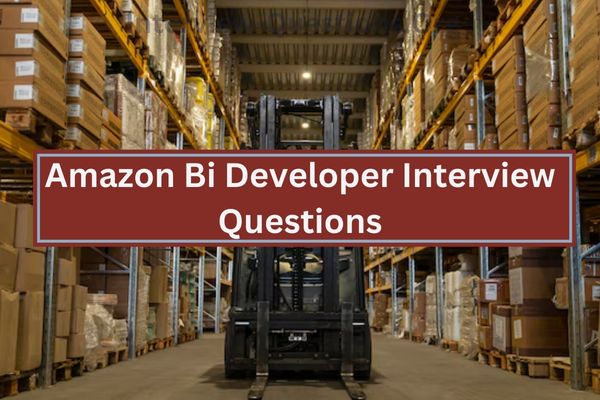Amazon Bi Developer Interview Questions: Securing a Business Intelligence (BI) Developer role at Amazon requires a strong understanding of data analysis, technical skills, and business acumen. In this article, we present 50 potential interview questions to help candidates prepare for Amazon’s rigorous interview process.
Also See: FFA Officer Interview Questions
50 Amazon Business Intelligence Developer Interview Questions

These questions cover topics such as SQL proficiency, data modeling, reporting, and the alignment of BI solutions with business goals. Understanding and practicing these questions will enable candidates to effectively demonstrate their skills and knowledge, ensuring they stand out in the highly competitive BI Developer landscape at Amazon.
General Questions
- Tell us about yourself and your background in Business Intelligence (BI).
- Why do you want to work at Amazon as a BI Developer?
- How would you describe your experience with data visualization tools?
- What BI tools are you proficient in, and which is your favorite?
- What’s the difference between OLAP and OLTP databases?
- Can you explain the role of a BI Developer in an organization like Amazon?
- How do you stay updated with the latest BI trends and technologies?
- How do you prioritize multiple BI projects with tight deadlines?
- Describe a time when you faced a challenge in data analysis and how you resolved it.
- How do you ensure the accuracy of your reports and data models?
Technical Knowledge
- What’s the difference between a data warehouse and a data lake?
- Can you explain the ETL process in detail?
- What are the best practices for designing a data warehouse?
- How do you approach data normalization and denormalization?
- What is indexing in databases, and why is it important?
- How do you handle slow-running queries in SQL?
- Explain the concept of data partitioning and its benefits.
- Can you describe the star and snowflake schema in data warehousing?
- What are aggregate tables, and when would you use them?
- How do you optimize the performance of a BI system?
SQL & Database Questions
- How would you write an SQL query to find duplicate records in a table?
- What’s the difference between INNER JOIN, LEFT JOIN, RIGHT JOIN, and FULL JOIN?
- Can you explain window functions in SQL? Give an example.
- How would you calculate running totals using SQL?
- Write a query to find the second-highest salary in a table.
- What are common table expressions (CTEs), and when would you use them?
- Explain the difference between UNION and UNION ALL in SQL.
- How do you handle NULL values in SQL queries?
- What is a subquery, and how does it differ from a JOIN?
- Write an SQL query to calculate the moving average of sales over the last 7 days.
Data Modeling & Reporting
- What are the key considerations when designing a BI dashboard?
- How do you define KPIs (Key Performance Indicators) for a business intelligence report?
- Explain how you would handle missing or incomplete data in a dataset.
- How do you ensure data security and privacy in your BI solutions?
- How do you define fact and dimension tables in data warehousing?
- Can you give an example of a business metric you helped improve using BI tools?
- What is data granularity, and why is it important in BI reporting?
- How do you structure your reports to make them easily understandable for non-technical stakeholders?
- Describe your experience with self-service BI tools (e.g., Amazon QuickSight, Tableau, Power BI).
- How would you explain the findings of a complex BI report to a non-technical audience?
Business Acumen
- How do you determine which data is most valuable for decision-making in a business context?
- Can you provide an example of how your BI work has influenced a business decision?
- How would you evaluate the success of a BI project?
- How do you approach gathering requirements from stakeholders for a BI project?
- What business problem have you solved using BI, and what was the impact on the business?
- How would you handle conflicting requirements from different departments for a BI solution?
- How do you align BI solutions with the overall goals of the business?
- Describe a time when your BI analysis was incorrect or led to a wrong conclusion. How did you handle it?
- How do you measure the ROI (Return on Investment) of a BI solution?
- What metrics would you use to evaluate the performance of Amazon’s e-commerce platform?
Preparing for an Amazon BI Developer interview requires comprehensive knowledge of both technical and business concepts. By mastering these 50 questions, candidates can confidently showcase their expertise in data analysis, reporting, and problem-solving, ultimately improving their chances of securing the role.